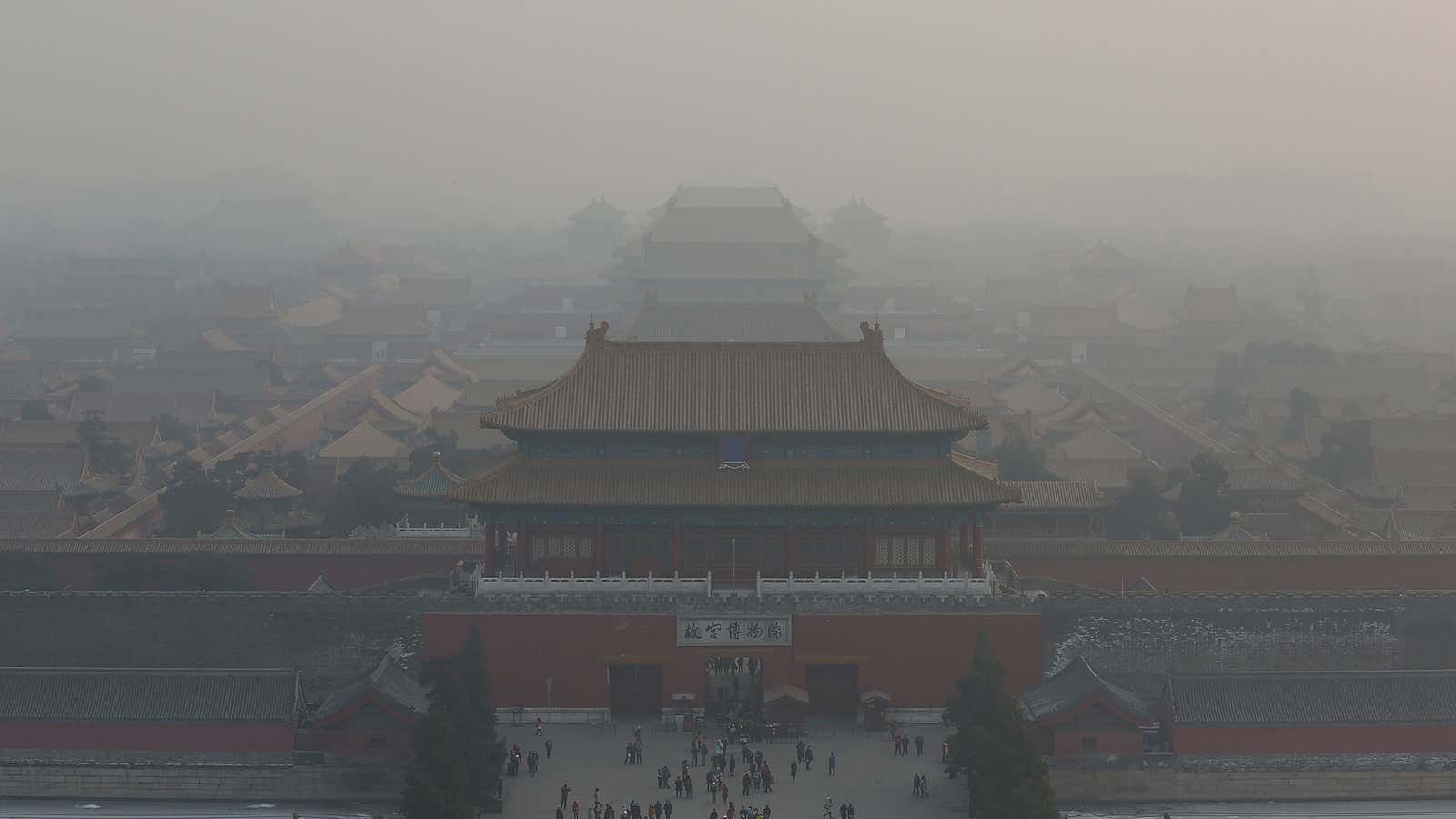Could smog be the undoing of China’s communist regime?
Chinese official media used to describe the country’s pollution problem as a necessary but temporary consequence of its economic transformation. But this week, Chinese authorities let media report not just extensively but critically on a heavy blanket of smog—the result of pollution 20 times the international standard—that settled over Beijing for days.
Why change tune? Because the Chinese government realizes there’s no other issue with as much potential for mass unrest in China today as public health. Many Chinese don’t care about politics. But they do care about contaminated food, poisoned water, and the long-term effects of air pollution–just some of the health problems caused by China’s development over the past two decades.
More importantly, public health concerns may be China’s most likely path to at least a nascent form of democracy. Anxiety is turning to anger, inspiring even the most apolitical Chinese to take to the streets in protest. At the same time, activism over environment and health issues is growing bolder.
China’s public health problems are many and the public is aware of them. Polluted air and water have given rise to “cancer villages.” Worries about made-in-China toys, toothpaste, or medicine are that much worse in China. As we’ve reported before, concern over food safety, and air and water pollution has spiked in the last decade. The number of Chinese newspaper stories on food safety increased from 277 in 2000 to 23, 359 (pdf, p. 107) in 2007, and the number of stories on water safety went from 21 in 2000 to 6,144 in 2007. Chinese tourists visiting Australia, distrustful of milk formula in their own country, have recently been responsible for a shortage in Australia.

Pollution or food scares have the ability to affect, and mobilize, large groups of people. Just last year, demonstrations that brought out thousands of city residents halted plans to build a copper plant, a waste water pipeline and a chemical plant. In contrast to “mass incidents,” which often involve striking workers at factories, environmental protests are aimed at entire cities. These protests are made up of mostly middle-class Chinese (the kind who generally approve of the Chinese leadership).
Moreover, a budding Chinese environmental movement is giving Chinese people opportunities to organize and voice discontent. Social organizations not tied to China’s communist party are severely restricted, but NGOs and other groups working on green and public health causes (deemed “politically safe”) have been allowed to flourish over the past decade. The organizations hold public discussions online, launch media campaigns and sometimes advise the government.
It’s not that authorities have given environmental groups, demonstrators or media free reign when it comes to public health issues (several protesters were arrested at these demonstrations and Chinese media traditionally emphasizes government’s efforts to resolve problems). Rather than foment more dissent by cracking down, authorities have chosen to work on giving an appearance of more transparency. “Leaders are aware that the people can wait 20 years or more for democracy, but they can’t wait that long for clean air,” says Liu Jianqiang, editor of China Dialogue, which covers environmental issues in China.
Still, media and environmental groups and individuals have to work subversively. Demonstrators organize online by calling on city residents to sanbu “take a walk” by a certain site at a certain time, being careful not to use the word protest, says Guobin Yang, who researches environmentalism in China at the University of Pennsylvania. Environmental groups, still closely watched by the government, don’t mobilize demonstrations but do organize seemingly innocent things like community clean-ups. “Citizen organizing is very political,” Yang says. ”[These groups] are becoming bolder and bolder. They’ve become more strategic and they are slowly carving out more space. You can think about this as politics by other means,” he says.
It’s bold to say unrest over China’s public health problems could bring about democracy in China. But it wouldn’t be the first time something like this has happened. Environmental protests in Taiwan in the 1980s over pollution caused by the island’s industrialization are often credited with improving the people’s sense of political efficacy and pushing Chiang Ching-Kuo to lift martial law in 1987, beginning a years-long process of democratization.
Aware of the threat to the party’s credibility and very existence, Chinese leaders have been asking for the public’s patience and taking measures like offering $48,000 awards to food safety informants. Whether or not this is too little, too late to move many Chinese back into a state of complacency remains to be seen. Here’s hoping it is.
